Coronavirus: Aussies to benefit from largest job rescue package as virus criminals warned
Six million Aussie workers are now a step closer to wage security amid the coronavirus crisis after the largest job rescue package in Australia’s history was passed through parliament’s lower house
Coronavirus
Don't miss out on the headlines from Coronavirus. Followed categories will be added to My News.
The largest job rescue package in Australia’s history has passed through parliament’s lower house, bringing six million workers one step closer to wage security amid the coronavirus crisis.
The federal government’s JobKeeper legislation was passed through the House on Wednesday afternoon without amendments to be debated in the Senate before a final vote expected later in the evening.
More than 710,000 businesses and sole traders have applied for the $1500 fortnightly wage subsidy for their staff so far, with more expected to register once the bill has passed.
Expected to cost about $130 billion over the next six months, the JobKeeper scheme is designed to keep workers tied to their employers so businesses can fire up again as soon as the virus threat is gone.
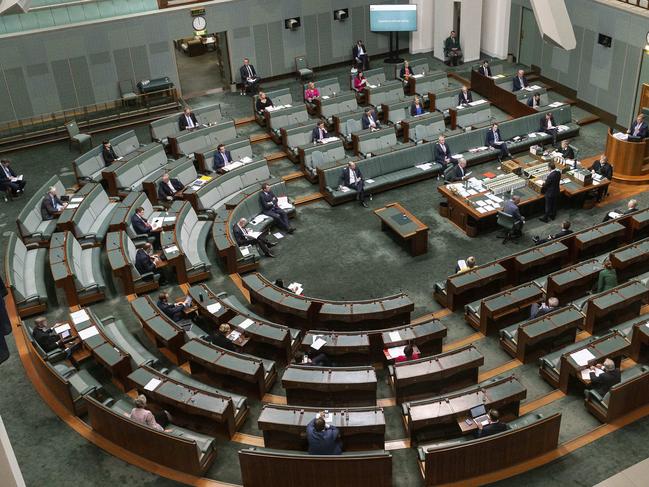
The cash is expected to start flowing to businesses from May 1, but Prime Minister Scott Morrison said employers can pay their workers $1500 a fortnight with confidence this month as the government is backdating payments to March 30.
Six million workers are expected to receive the subsidies, but Labor and the unions have raised concerns a further 1.1 million casual workers would miss out.
Mr Morrison on Wednesday said Australia would beat the coronavirus and return to its previous way of life, but not without costs and losses.
“We will respond to this challenge, and we are up to the fight,” he said.
“We will pay the price needed to protect our sovereignty, and we will chart our way out.”
MORE NEWS
The Aussies suffering the most from isolation anxiety
Cyber crims use COVID-19 to target home-based workers
Radiation levels soar as Chernobyl burns
But Labor leader Anthony Albanese warned the unprecedented economic support measures had Australia heading “for a trillion-dollar debt”.
“It is a bill that will saddle a generation,” he said.
The Opposition unsuccessfully moved several amendments to expand eligibility of the JobKeeper payment to include casuals who had been employed for less than 12 months and temporary visa holders unable to return home.
Treasurer Josh Frydenberg confirmed he had the ability to alter the scheme to include other people once it passed, but he would not use it to include more casuals.
He said the massive package was a “game changer” which would save millions of jobs.
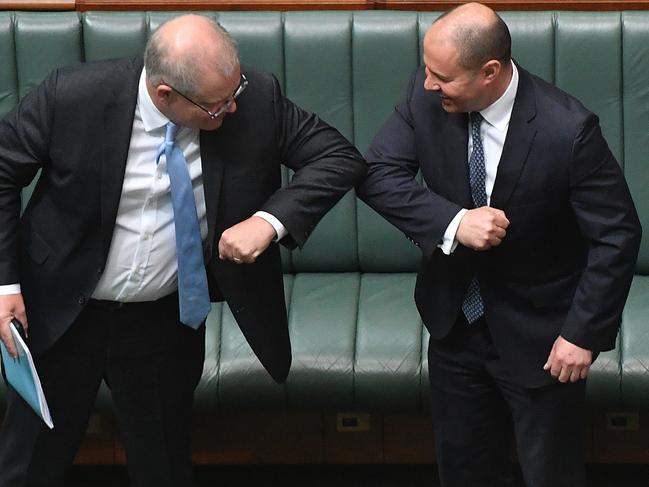
“This is a very substantial program and indeed a program like of the businesses who have already applied for the wage subsidy for their full, part time and casuals who have been with the company for at least 12 months, the overwhelming majority were small businesses,” Mr Frydenberg said. “It’s an Australian solution to an Australian challenge.”
About 246,000 companies with an income of $2 million or less have applied, compared to just over 2,900 businesses earning more than $250 million.
About 5,800 not for profit companies have also registered for JobKeeper.
Taking in all types of businesses, about 35 per cent of the total registrations were from NSW, followed by 27 per cent from Victoria and 19 per cent in Queensland.
A Senate select committee has been established to review the federal government’s response to the pandemic.
LIFE BEHIND BARS FOR VIRUS CRIMINALS
Anyone who deliberately passes on coronavirus to a healthcare worker could face life being bars if the person who gets infected dies.
Health Minister Greg Hunt warned there had been some “very troubling cases” of people threatening doctors and nurses by verbally abusing or coughing on them.
Mr Hunt reminded all Australians of the penalties and the seriousness of the offence amid the global pandemic.
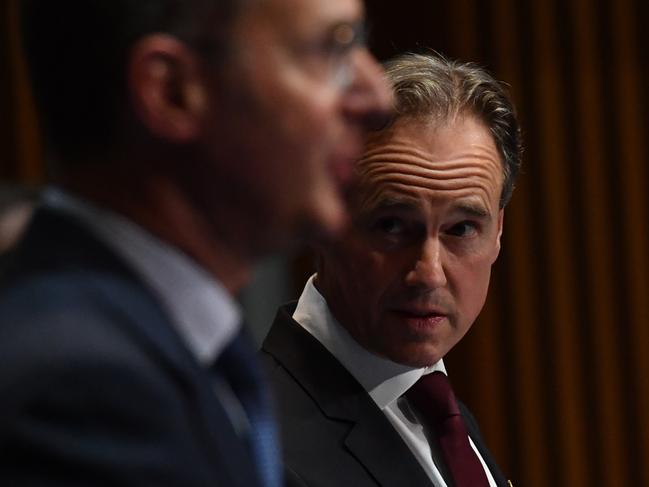
“The deliberate transmission of COVID-19 is an offence under the general criminal laws which apply in every state and territory,” Mr Hunt said.
“The most serious of these open fences may carry maximum penalties up to imprisonment for life, if somebody was to take a step which led to the death of a healthcare worker if it were a deliberate transmission.”
He also warned it was against the law to make someone fear they had been infected, with two people in the ACT already being charged for this.
“[Healthcare workers] are our heroes,” Mr Hunt said.
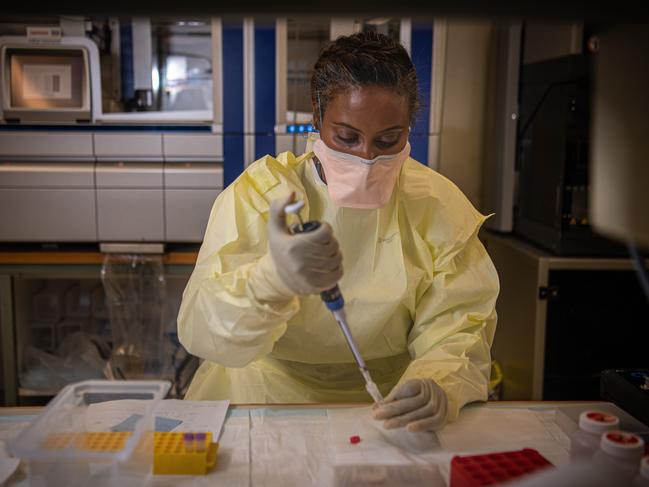
“Australians are overwhelmingly supporting and protecting our healthcare workers. I want to say thank you to our doctors, our nurses, our pharmacists, our allied health workers.”
On the whole, Mr Hunt insisted Australians had been doing the right thing and were to be largely congratulated on their adherence to social distancing measures.
“Every one of us has the gift of being able to save lives by not transmitting coronavirus,” Mr Hunt said.
“Any one of us could inadvertently lead to a tragedy by not adhering to the rules.
“These steps are immensely important, and even more important over this Easter.
“This Easter is the time where we can lock in the gains we have made as a country.”
More than 313,000 coronavirus tests have been conducted, with the country’s positive test rate sitting at 2 per cent.
Mr Hunt also announced the allocation of 11 million masks to health workers across the country.
Seven million are going to hospitals, 2.3 million to the primary health network, including general practices.
GROCERIES GIVEN BORDER CLEARANCE
Border clearance for groceries will be fast tracked during the coronavirus crisis to keep supermarkets stocked with basic items including rice, pasta and coffee.
The Department of Agriculture, Water and the Environment is boosting staff levels to speed up the inspection and assessment of imported groceries without compromising biosecurity.
Head of biosecurity Lyn O’Connell said while Australia was a major food producer, imported groceries accounted for about 16 per cent of household consumption.
“This includes highly processed fruit and vegetables, chocolate, coffee, pasta and rice – some of which are in high demand at the moment,” she said.
Ms O’Connell said the department was completing import inspections “as quickly as possible”.
“Dedicated staff will prioritise these applications so we can get product on the shelves quicker to complement Australia’s supply of quality fresh food produced from all parts of the country,” Ms O’Connell said.
“Streamlining the import processes for items such as frozen processed foods would help ensure supermarkets are fully stocked.”
The fast tracked process only applies to imports of groceries by supermarkets.
It does not apply to other imports of goods, including by members of the public.
‘BIGGEST LIFELINE’: PM’S MESAGE
Coronavirus is a fight Australia will win but not without losses, Prime Minister Scott Morrison has declared.
Speaking to parliament, which is sitting in a reduced capacity today to pass the federal government’s JobKeeper wage subsidy legislation, Mr Morrison said Australia had to consider “extraordinary responses” to the health and economic crises caused by the coronavirus.
“Today we act to protect Australia’s sovereignty,” he said.
“When Australian lives and livelihoods are threatened, when they are under attack, our nation’s sovereignty is put at risk, and we must respond.”
Mr Morrison said the wage subsidy was not about political ideology, insisting Australia would “never surrender” its vibrant market economy, high standard of living or strong social safety net.
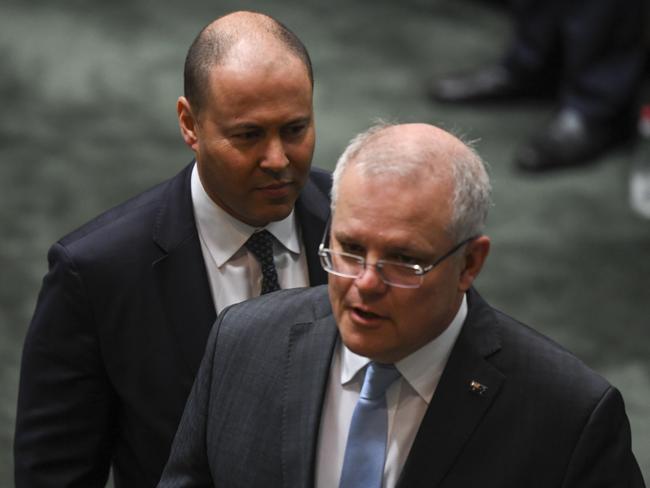
“Make no mistake, today is not about ideologies,” he said.
“Today is about defending and protecting Australia’s national sovereignty.
“It will be a fight. It will be a fight we will win. But it won’t be a fight without cost, or without loss.”
Mr Morrison said the $130 billion JobKeeper package was about agreeing to “pay the price” for beating COVID-19.
“Today, as a government, I want to commit to all Australians, as Prime Minister, once we have overcome these threats, and we will, we will rebuild, and we will restore, whatever the battle ahead takes from us,” he said.
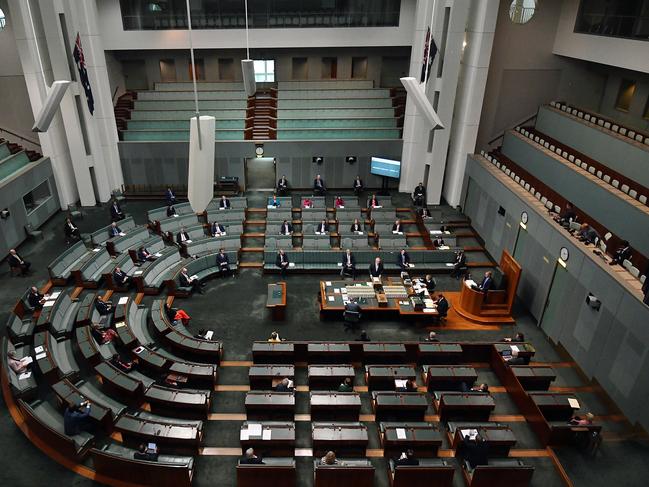
“This has been our road in. We will now lead the country on the road through and in the road out and beyond.”
Mr Morrison said in the 16 days since parliament last met in Canberra the number of coronavirus tests conducted in Australia had doubled.
“Sadly, there have been almost 50 deaths in Australia,” he said.
“Tens of thousands more have died across the world.”
Mr Morrison offered condolences to Cooper MP Ged Kearney, who lost her father-in-law to the virus.
“On behalf of the government and the parliament, I extend our deepest sympathies to the
member for Cooper and her family,” he said.
“As they are, with all who have lost loved ones, both in recent times, here and overseas, and are fearful of that event occurring in the future.”
Mr Morrison also extended Australia’s “best wishes” to UK Prime Minister Boris Johnson, who remains in intensive care battling COVID-19.
“Get well soon, Boris. We need you,” he said.
Mr Morrison said two weeks ago new coronavirus cases in Australia were growing at more than 20 per cent a day.
“In recent days, it has averaged two per cent a day,” he said.
“This is very encouraging. We are flattening the curve. We are buying ourselves precious time in this fight.
“And I want to thank the overwhelming majority of Australians for doing the right thing.
“You are saving lives, you are saving livelihoods.”
But Mr Morrison warned these efforts must continue to avoid the progress being undone.
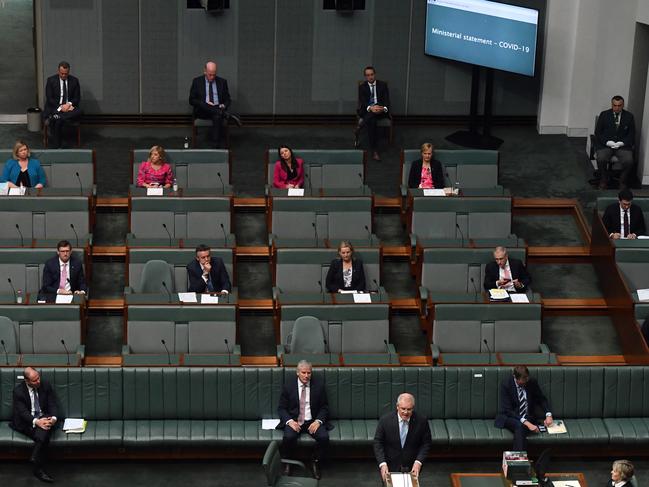
“We are only a few days away from Easter, a time that should give us great hope, and the message is clear, though. Stay home, don’t travel, don’t go away,” he said.
It comes as South Australia suffered a second death to coronavirus, pushing the national death toll to 50.
A 62-year-old Adelaide woman, who was a passenger on the Ruby Princess cruise liner, passed away in hospital.
Victoria also recorded its twelfth death from COVID-19 following the death of an 80-year-old woman in hospital.
LABOR SEEKS TO EXPAND GOVERNMENT WAGE SUBSUDY
Labor is seeking to expand the government’s wage subsidy to support more casual workers and temporary visa holders unable to go home, but will not block the JobKeeper bill.
Opposition leader Anthony Albanese said Labor would vote for the $130 billion package before parliament on Wednesday, even if the party’s proposed amendments do not pass.
“We owe it to all Australians to keep our eyes open … the scale of this expenditure
that we’ll consider today is without equal in our nation’s history,” he said.
“We are headed for a $1 trillion debt.
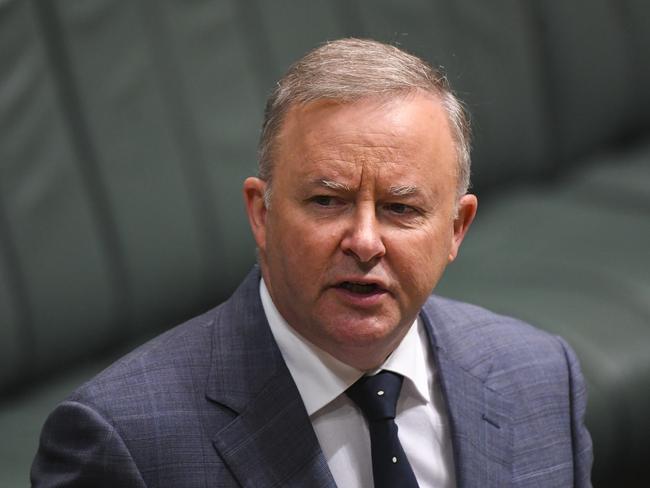
“It is a bill that will saddle a generation. With this comes a compelling need for scrutiny and forensic oversight.”
Mr Albanese said the government deserved “credit” for adopting measures which stood in “direct contravention” of its own economic position over many years.
“Even though we have concerns about some elements of the package and would like to see it improved and we will make suggestions to improve it. We will support the legislation, even if our suggestions are not adopted,” he said.
Mr Albanese said Labor’s amendments would include expanding the $1500 JobKeeper payment to support casual workers who are continuously employed but not necessarily for the one business.
“There are over one million Australians who are casual workers, who will not be eligible for the JobKeeper program,” he said.
MORE NEWS
Ask the Expert: What to do if you can’t pay the bills
Telstra rolls out 2500 jobs, customer discounts
Songwriter John Prine dies of COVID-19 complications
“Every worker who misses out means the relationship between that worker and their employer risks being broken.
“And when you break this relationship, you not only weaken the existing economic position of both the worker and their employer, but the pace of economic recovery coming out of this crisis.”
Mr Albanese said Labor was concerned about the lack of support for temporary visa holders who were not able to return to their home countries due to border lockdowns.
“I agree with the Prime Minister – if a temporary visa worker can go home in the midst of this crisis, they should,” he said. “But the reality is that most cannot.
“As borders close and international flights are cancelled – that means there are some one million people who remain in Australia without work, without access to healthcare, and without a means of support.”
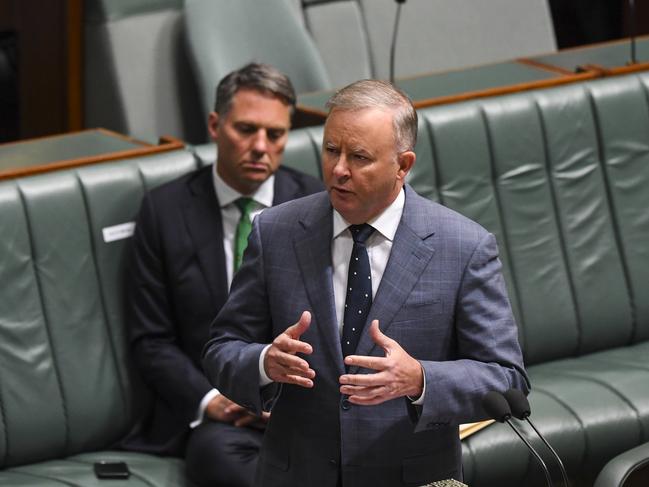
Mr Albanese commended Australians for supporting each other during the coronavirus crisis and following social distancing restrictions to flatten the curve.
“While Australians have been forced to be 1.5m apart, in so many ways, we have never been closer together,” he said.
It comes as a new coronavirus warning text is being sent to all Australians urging them to stay at home this Easter.
The message from the federal government began arriving on mobile phones today, ahead of the Easter long weekend.
“Stay home this Easter and helping save lives,” the text from AusGov said.
“Only leave for what you really need (plus) exercise, work and medical care.”
Last week the government sent a message to all Australian mobile phones asking people who were sick to stay at home.
The texts are part of a $30 million public information campaign which also includes TV, radio and newspaper ads as well as billboards and signs on bus stops.
‘CONSULT YOUR DOCTOR’
People ignoring normal health complaints during the coronavirus pandemic are putting themselves at risk of serious illness, doctors have warned.
Mr Hunt has pleaded with Australians to continue seeking regular health care for chronic conditions to avoid future complications.
“While COVID19 is rightly front and centre in all our minds, it’s vitally important people with existing chronic health conditions continue to consult with their doctors,” he said.
“In Australia, these common chronic conditions contribute to 61 per cent of the burden of disease, 37 per cent of hospitalisations and 87 per cent of deaths.”
Mr Hunt said the leading causes of death, disability and illness in Australia included arthritis, asthma, back pain, cancer, cardiovascular disease, chronic obstructive pulmonary disease, diabetes and mental health conditions.
“A failure to keep appointments and continue treatment could also put you at greater risk of being severely affected by COVID-19 and place an unnecessary burden on a hospital system dealing with the pandemic,” he said.
Deputy Chief Medical Officer Professor Michael Kidd said there were measures in place to help people get medications, have blood tests and other face-to-face care.
“I know many people are very worried about leaving their own homes, but it is totally acceptable to leave your own home to attend a medical appointment, to attend a pharmacy, to get a blood test done if this is what is required,” he said.
“But while you do, please make sure you are adhering to the physical distancing measures which are in place to protect you and to protect everyone across Australia.
“If you have a mental health condition, again, it is incredibly important you continue to stay in touch with your therapist, and again, this can be carried out through telehealth.”
Australian Medical Association President Dr Tony Bartone said Australia’s world-class health standards could be hurt if people avoid necessary treatment.
“We are putting all of that at risk because the community is fearful, the community is worried about whether they should be accessing the care at a time when they think that their
doctor, their health provider, is overrun with the needs of providing for COVID-19,” he said.
“Healthcare doesn’t take a holiday. Cancer doesn’t take a holiday. Neither does heart disease, neither does stroke.
“We need to ensure regular care, and I would implore all … patients and the community to keep that healthcare up and talk to their doctor over the coming months.”
CAR ACCESSORIES MAKER TO MAKE FACE SHIELDS
Vital plastic face shields needed to protect frontline health workers and supermarket staff from COVID-19 will be produced in Australia at the rate of hundreds of thousands per day in the next few weeks.
Queensland automotive accessory manufacturer EGR Group has switched its operations to producing the protective face shields.
It says it will be churning out the shields at the rate of hundreds of thousands a day from late April for domestic and international use, removing the need for Australia to import the products from overseas.
The face shields will also be useful for staff in the retail sector, in particular those stocking shelves and walking through aisles, the company said.
“We’re the only company in Australia that manufactures this type of material on a mass scale,” EGR Group Director Rod Horwill said.
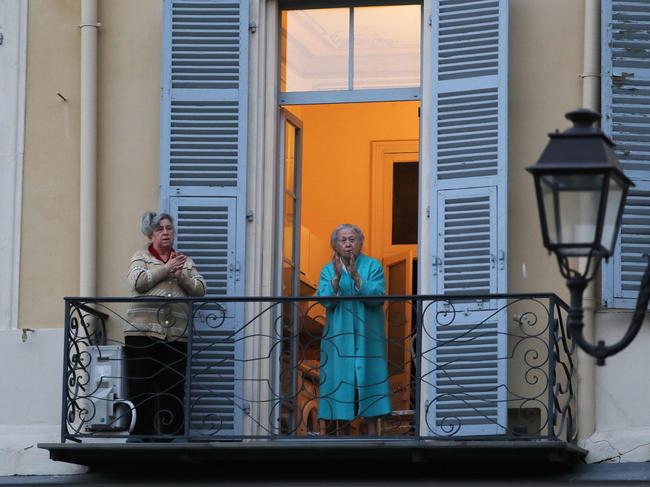
“We already produce thousands of tonnes of plastic sheeting a year for the automotive industry in Australia and globally.”
The company said it was now planning to create a new personal protection equipment division to supply the local health industry into the future.
“With the automotive industry slowing as a result of the pandemic, this innovative approach of fast-tracking our research and development into this much-needed health product means we’re able to provide job security for up to 800 Queenslanders,” Mr Horwill said.
“The face shields are designed, developed and manufactured right here in Brisbane with export opportunities in the US, New Zealand, South Pacific and Papua New Guinea.
“We’ve already received inquiries from the health sector in the US as they too face this ongoing global health crisis.”
GLOBAL TOLL NEARING SHOCKING MARK
More people have now been killed by COVID-19 in New York City than were killed in the 9/11 terror attacks as France records the most shocking single-day record of death since the pandemic began.
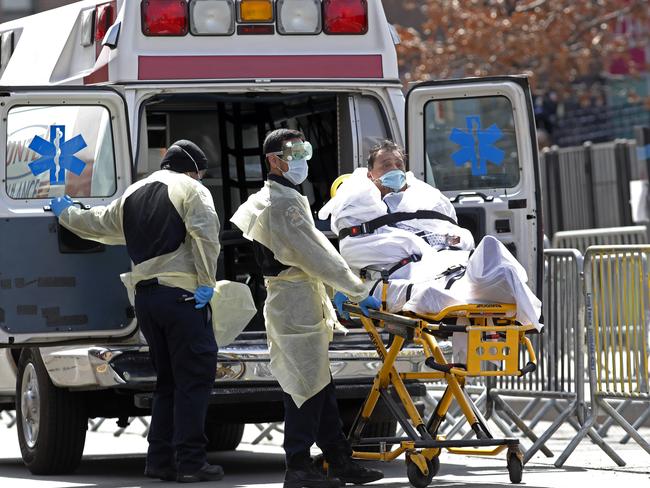
The global death toll surpassed 80,000 on Wednesday as France reported a shocking 1417 deaths in a single day – the worst 24-hour tally on record.
This made France the fourth country in the world to record more than 10,000 deaths, joining Italy, Spain and the US.
In a worrying sign countries might find it impossible to “flatten the curve”, Spains’s daily death toll jumped again – to 743 – after five days of falling numbers.
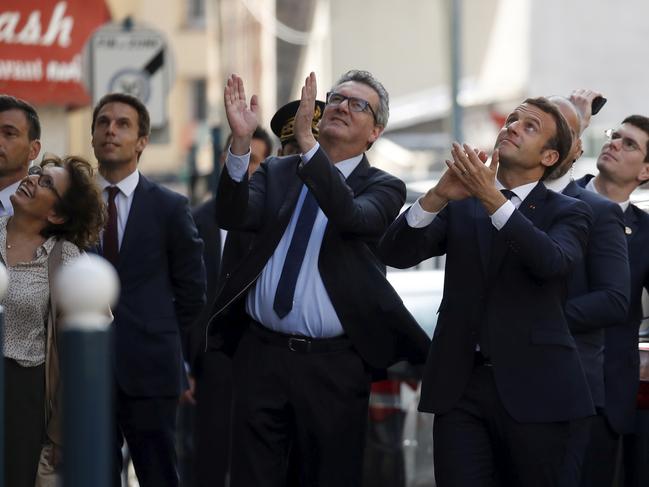
The figure is up from the 637 people who died in the previous 24 hours and takes the country’s total death toll to 13,798, the second-highest in the world after Italy, which has recorded more than 17,100 deaths.
The news came as the global infection toll passed 1,380,000 early Wednesday morning AEST.
The UK has recorded 786 new deaths in 24 hours – the highest single daily death toll to date, taking the country’s tally to more than 6100.
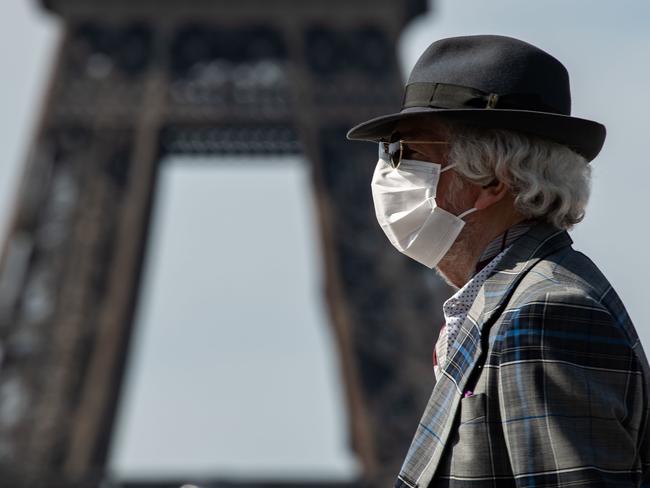
Despite New York Governor Andrew Cuomo’s assurances “the apex” was near for his state, New York also recorded its worst single-day death toll, 731, pushing its tally beyond 5000.
The virus has now killed more people in New York City (3202) than the number who died there in 9/11 (2996).
The US death toll has tripled to more than 11,000 in the past seven days as some states still refuse to issue formal “stay at home” advice or orders.
TRUMP: WORLD HEALTH ORGANISATION ‘VERY CHINA-CENTRIC’
President Donald Trump says he will put a hold on US funding to the World Health Organisation, saying “they missed the call” on the coronavirus pandemic.
Trump made the announcement at a White House press briefing on Tuesday local time as deaths and infections across the country continued to rise.
Trump criticised the organisation, saying it “called it wrong” and saying it seemed to be “very China-centric”.
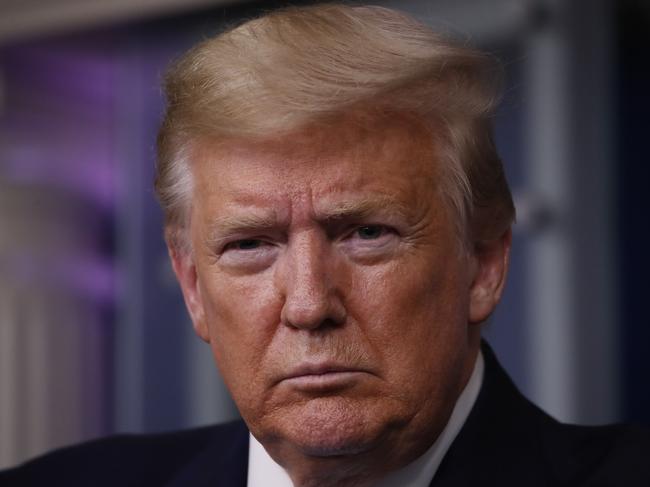
“They should have known and they probably did know,” he said, adding he had not seen memos by White House trade Adviser Peter Navarro warning of coronavirus risks.
The WHO has praised China for its transparency on the virus, even though there is reason to believe more people died of COVID-19 than the country’s official tally.
Throughout his presidency, Trump has voiced scepticism of many international organisations.
‘QUARANTINE KIDS’ RUSHED TO HOSPITAL
A child and adult rushed to hospital from a Sydney quarantine hotel on Tuesday night have tested positive for COVID-19.
The child was one of three children removed from the rear of the Hilton Hotel in the centre of Sydney by medical staff wearing full protective gear.
The children, their siblings and parents were rushed into waiting patient transport vehicles on Pitt Street, Sydney.
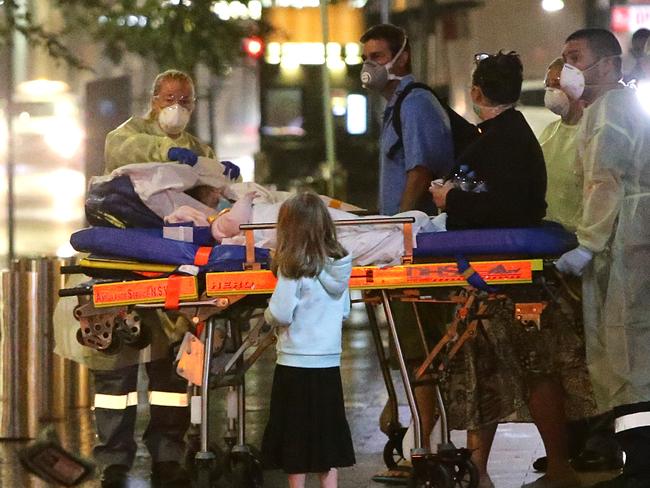
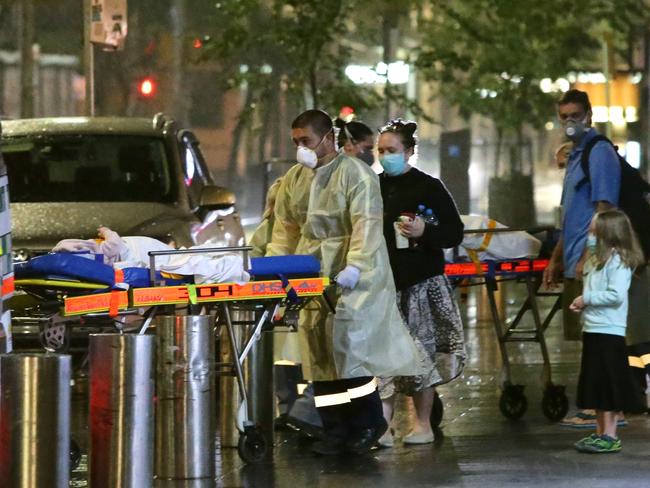
It is understood the children in Sydney were taken to Royal Prince Alfred Hospital.
The emergency unfolded as the first group of return travellers were released after finishing their two-week forced isolation period at midnight on Tuesday – two hours after the children were taken to hospital.
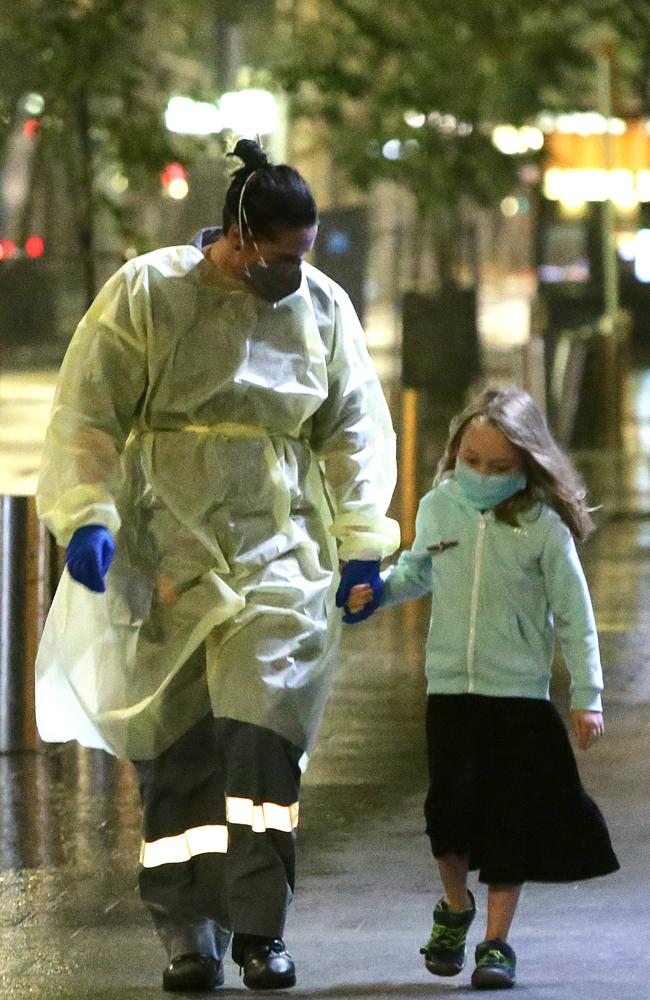
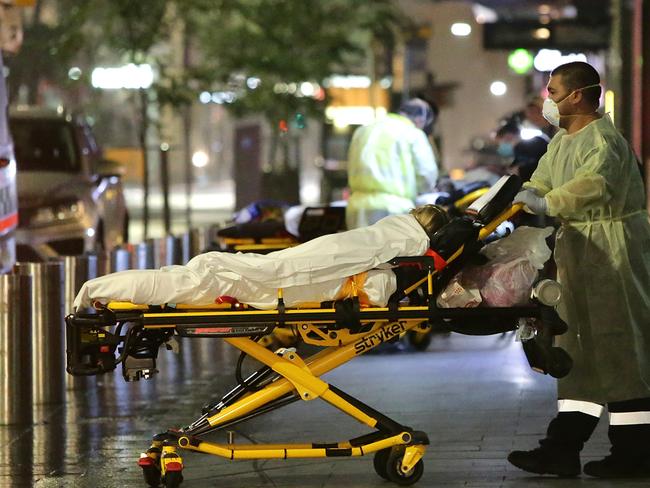
QUARANTINE PATIENTS NOT BEING TESTED BEFORE ‘RELEASE’
Some COVID-19 patients are still testing positive, despite being told they have served out their quarantine period.
In the early stages of the virus outbreak in Australia, an infected person had to test negative on two tests 24 hours apart before being released from quarantine but this rule is no longer applied.
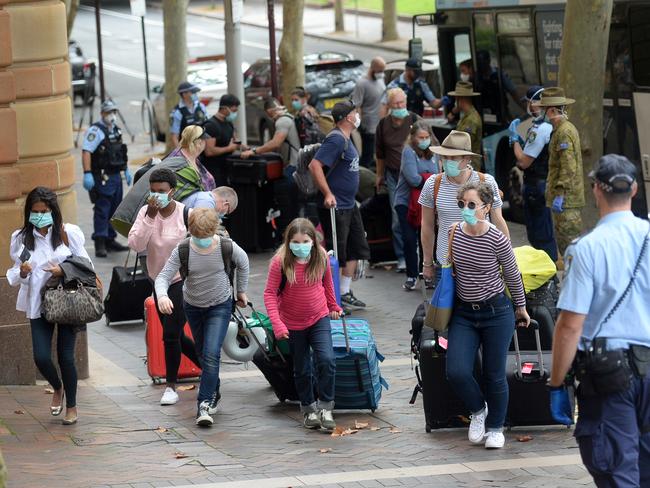
In China, it has been reported a small percentage of people who tested negative after recovering from the virus later tested positive for COVID-19 even though they were not displaying symptoms.
It is unsure whether they caught the virus again or they were still fighting the virus and still infectious.
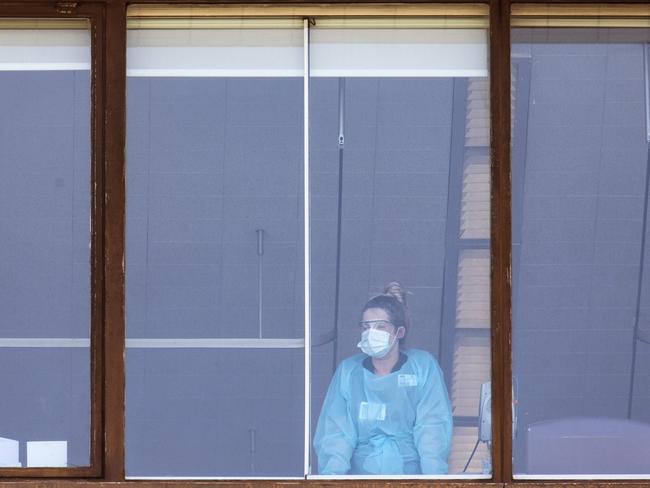
In South Korea, at least 51 patients diagnosed as having fully recovered from the coronavirus in have tested positive a second time after leaving quarantine, according to officials.
The patients from Daegu all tested positive in a “relatively short time” after they were given the all clear from their initial infections, the Korea Centers for Disease Control and Prevention (KCDC) said.
A specialist team has been sent to conduct an epidemiological investigation in the city, which is the epicentre of the epidemic in South Korea, the agency says.
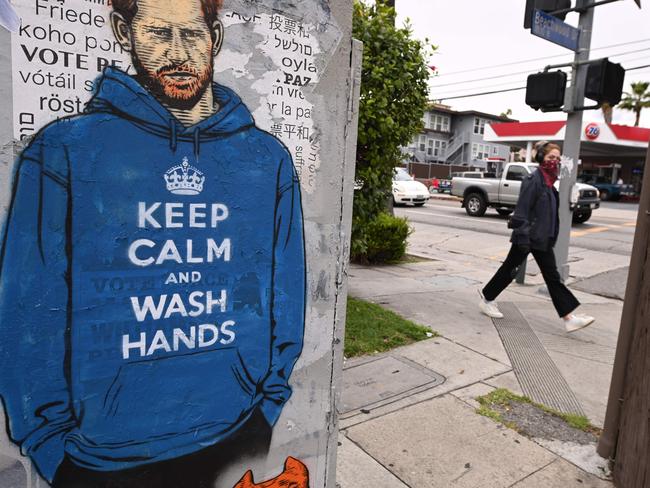
US CONFIDENT OF ACHIEVING ‘LOWER DEATH TOLL’
US officials said the country’s COVID-19 death toll was going to be lower than early estimates because Americans were complying so well with social distancing.
Surgeon General Jerome Adams said he “absolutely” believed deaths would be lower than the 100,000 to 240,000 figure predicted last week by the White House task force if the behaviour continued.
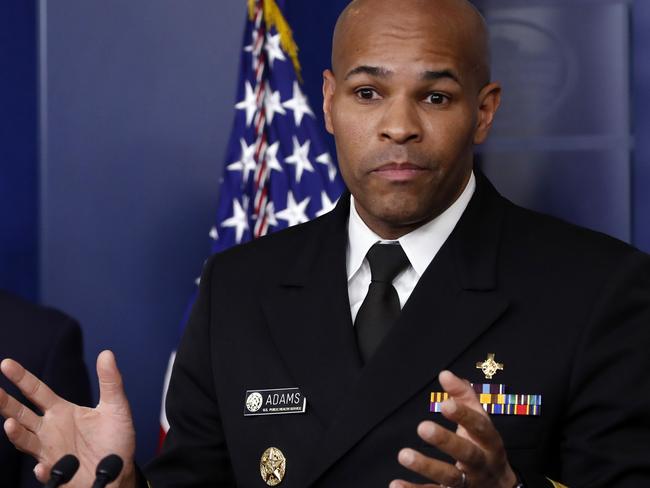
“I really do believe we will come in under those projections as long as we can continue to do our part for 30 days,” he said Tuesday, local time.
The Centres for Disease Control and Prevention (CDC) said the early models had assumed only half of US citizens “would pay attention to the recommendations”.
“What we’re seeing is a large majority of the American public are taking the social distancing recommendations to heart,” CDC Director Robert Redfield said during a radio interview on Monday.
“And I think that’s the direct consequence of why you’re seeing the numbers are going to be much, much, much, much lower than would have been predicted by the models.”
TWITTER FOUNDER PLEDGES A THIRD OF HIS WEALTH
Twitter CEO Jack Dorsey has pledged almost a third of his wealth, $A1.5 billion to coronavirus recovery.
Mr Dorsey used Twitter to say he was “moving $1b of my Square equity” to the #startsmall organisation.
It would initially work to “disarm this epidemic” before shifting focus to girl’s education and health, as well as a universal basic income (UBI).
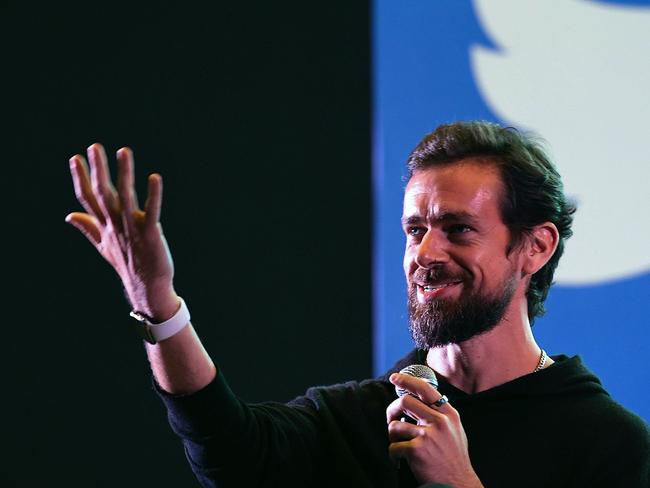
Former Democratic presidential candidate Andrew Yang, who had campaigned on a $US1000-a-month UBI for Americans, welcomed the move on Tuesday afternoon local time.
“Holy cow this is enormous,” he said on Twitter.
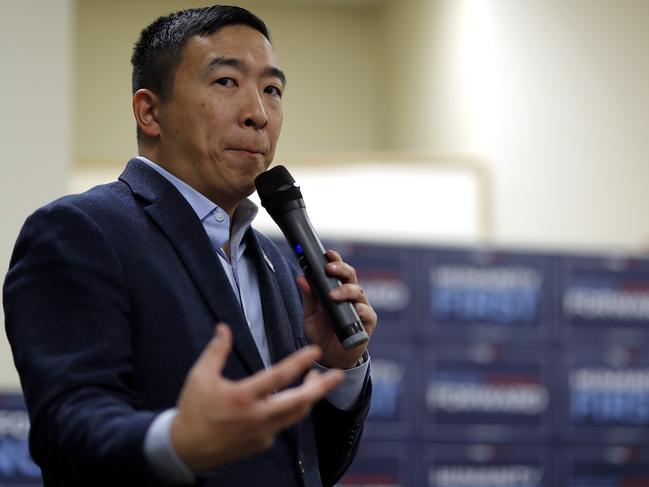
Dorsey said he was using equity from his financial services company because “I own a lot more of Square”.
Mr Dorsey is ranked 168th on Forbes 400 list.
QUEEN’S SUPPORT FOR BORIS AS HE ‘BREATHS WITHOUT ASSISTANCE’
British Prime Minister Boris Johnson is “breathing without assistance” in intensive care and is receiving only standard oxygen treatment, Downing Street says.
The comments came following concerns about Mr Johnson’s health after he was moved into intensive care at St Thomas’ Hospital in London.
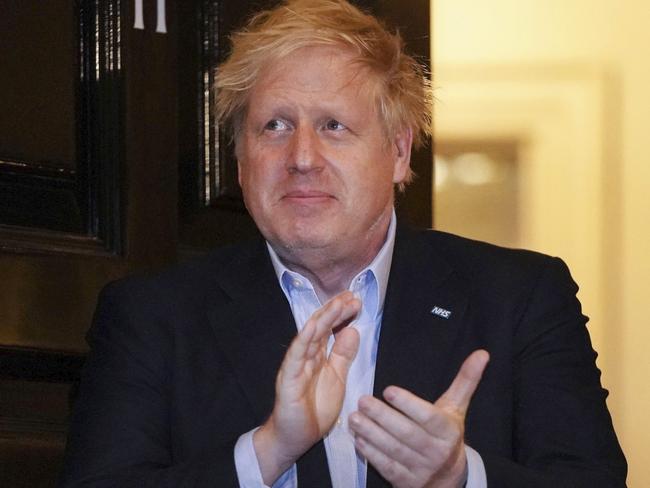
It comes as the Queen sent a message of support to the ill Mr Johnson.
Buckingham Palace this afternoon said her Majesty had been in touch to offer her best wishes, reports The Sun.
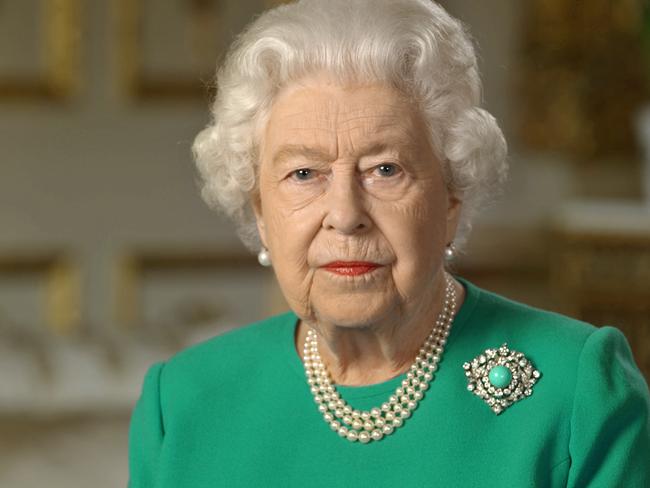
The Royal Family tweeted this lunchtime: “Earlier today The Queen sent a message to Carrie Symonds and to the Johnson family.
“Her Majesty said they were in her thoughts and that she wished the Prime Minister a full and speedy recovery.”
‘PRUDENT’ TO REINSTATE FOLLOW-UP TESTING
Australian Medical Association South Australian president Dr Chris Moy and the Consumer Health Forum’s Leanne Wells said it might be prudent to reinstate follow up testing at the end of quarantine periods to avoid transmission of the virus.
However, the Commonwealth Department of Health advises on its website COVID-19 tests cannot distinguish between “live” virus and non-infective viral material.
Each state has its own rules.
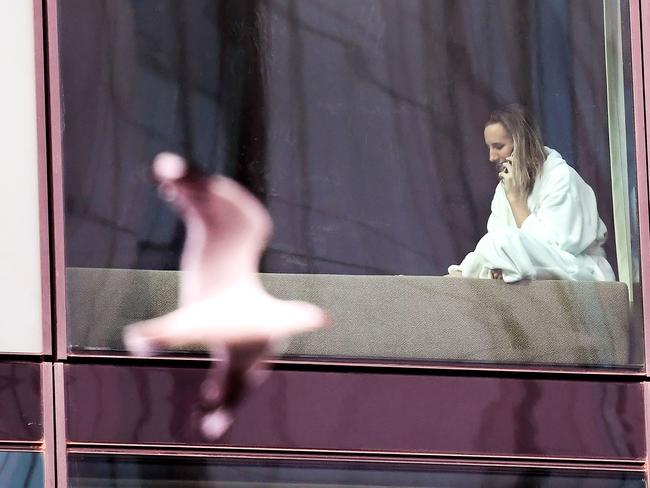
In Queensland you can return to normal activity if you have had no symptoms for the previous 72 hours and it has been at least 10 days since the start of your symptoms.
But if you had a severe bout of the virus and were treated in hospital you may be sent home and have to continue self isolation.
In Victoria if, at the end of 14 days, you are unwell with respiratory symptoms, you must stay in self-quarantine.
A NSW Health spokesman said “it should be noted that current tests cannot distinguish between ‘live’ virus and non-infective virus pieces”.
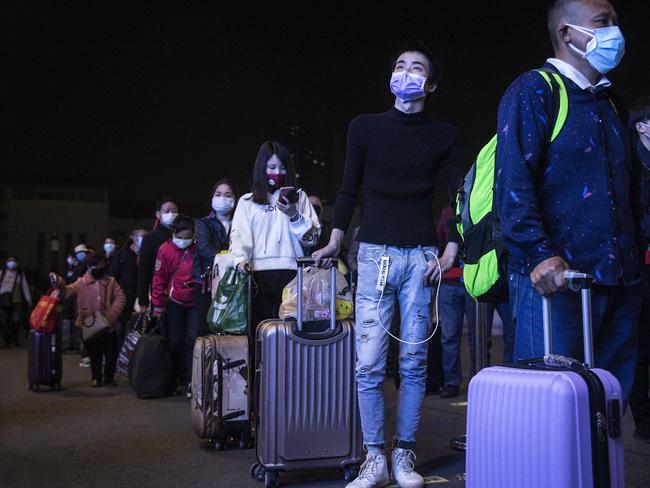
“The Communicable Diseases Network Australia has said that, based on clinical evidence, if someone has been ill with COVID, but had no symptoms for three days and when they are 10 days since symptom onset that they are likely to be no longer infectious,” the NSW Health spokesman said.
Anyone going back to work caring for patients at higher risk of severe disease, such as a hospital or an aged care facility, must return two negative tests before leaving isolation, the spokesman said.
NATIVE PLANT COULD HOLD KEY TO VACCINE
A native Australian plant has emerged as a potential tool in manufacturing a vaccine for COVID-19.
Professor Waterhouse, from Laboratory of Molecular Genetics (LMG) at Queensland University of Technology (QUT) said the plant, Nicotiana benthamiana – a close relative of tobacco – could help against COVID-19.
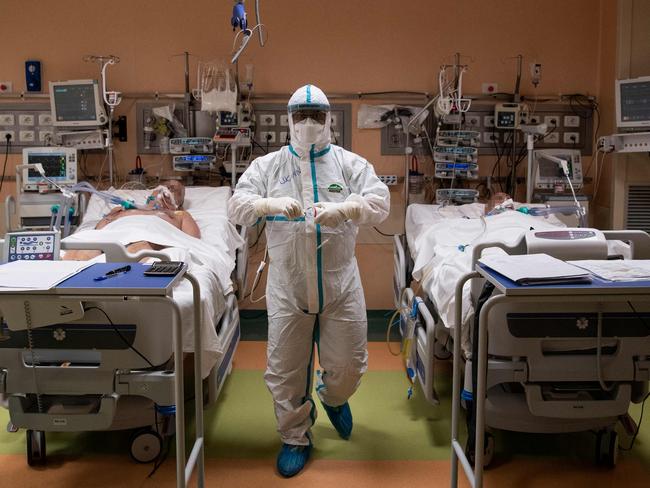
Biotechnologists inject or infiltrate the DNA instructions of how to make an antibody or vaccine into the plants leaves and the plant does the rest – producing the vaccine in its cells and sap.
The process known as molecular farming allows the vaccine to be produced in large amounts at low cost which is crucial for developing countries.
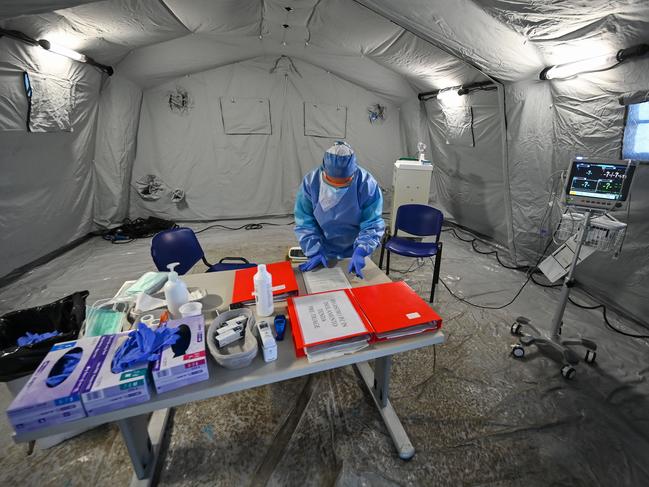
The plant, known in the lab as “benth”, is an ancient native tobacco plant that naturally grows only in northern and Central Australia, and may also hold the key to growing crops that can withstand disease and climate change.
‘RESERVE ARMY’ OF MEDICOS ON STANDBY
A national stocktake of non-practising doctors, dentists, pharmacists and nurses has created a “reserve army” of medicos as a rearguard to combat coronavirus as the nation moves into winter.
The nation’s 15 medical boards has contacted 40,000 former working medicos who have dropped out of the system mostly within five years, to tell them they could be required to work under temporary registrations.
And the call to arms is not necessarily to work in their field of expertise but any role in the national health system as required.
The move follows health authorities fearing the onset of cooler months could see the spread of COVID-19 like in the northern hemisphere, with those approached told their work may not necessarily be in their fields of expertise.
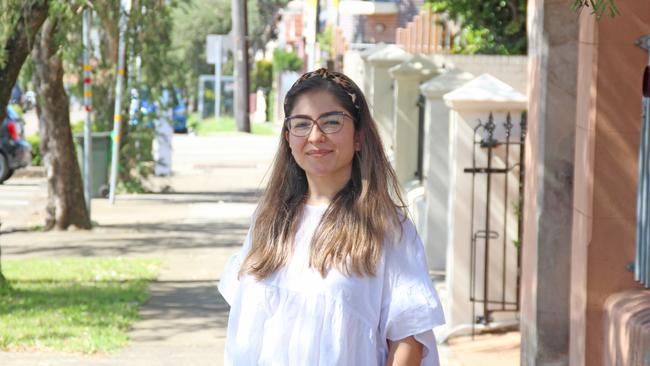
The Australian Health Practitioner Regulation Agency (AHPRA), the national organisation responsible for implementing registrations and accreditations said it was about being prepared.
The “Pandemic sub-register” to exist for 12 months from this month, followed the federal and health ministers for a fast-track call-up system if required.
The process is an opt-out system, meaning you’re on until you say you want off, was only finalised last Friday
Dentist Dr Mahda Firouzeei dropped out of the system in 2017 to focus on motherhood and was emailed in the last fortnight and says she is prepared to do whatever was necessary, her training having included basic medical work as well as qualifying dentist.
“We take an oath so if it comes to it yes we will live up to that and do whatever it is we are asked to do,” the 32-year-old Sydney inner west dentist said as she played with her 18-month-old son Robin.
“I got an email from the Dental Board saying they may need us to work outside of our scope of practice … I don’t know if it will get to the point that they’ll need us, they’ll obviously use doctors beforehand, but I guess they are taking all the precautions.
“They are preparing for the worst which is good that they have a plan and in one sense it gives you and the public some assurance that they are planning ahead so much.”
She is not alone.
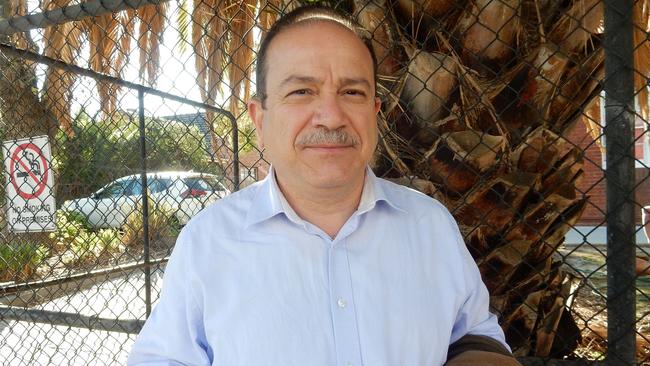
The Victorian migrant and refugee settlement agency AMES Australia said refugee medicos have also been contacted to not necessarily practice their specialities but other jobs like translating between doctors and culturally diverse patients.
Syrian refugee doctor Tamer Antakly said he was ready to do anything.
He had passed all of medical requirements to practice as a doctor but he was due to sit a language exam last Saturday which was deferred to June because of the outbreak.
“I would be very happy to help in the fight against this terrible disease, I feel it’s my duty as a doctor to do something to help,” he said.
“Being able to help would give me a feeling of satisfaction in contributing to this country – which has given my family safety.”
Originally published as Coronavirus: Aussies to benefit from largest job rescue package as virus criminals warned


